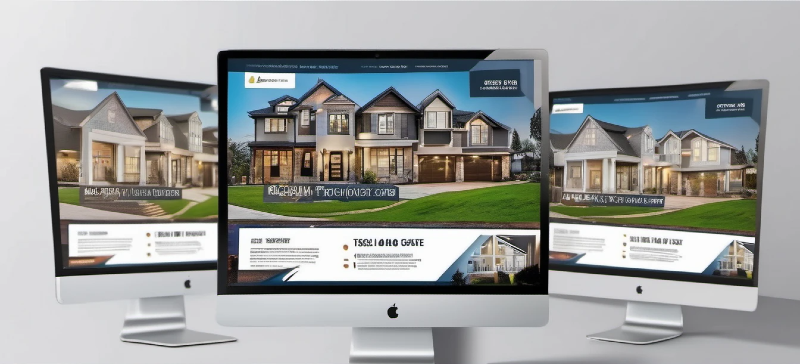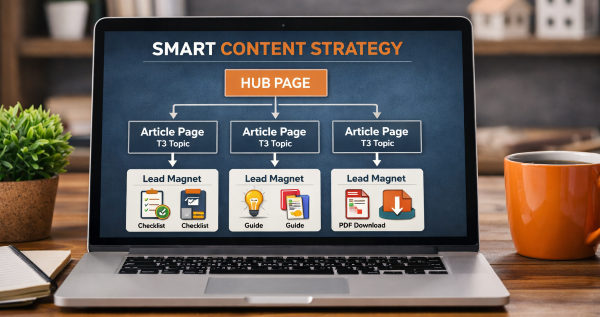Website Design for Realtors: Build Trust, Capture Leads, and Win the Click

Website design for realtors isn’t about looking “nice.” It’s about earning trust fast, guiding visitors to the right next step, and turning traffic into conversations.
In most markets, your website is the first showing. Buyers, sellers, and even other agents judge your professionalism in seconds: speed, clarity, mobile experience, and whether they can instantly understand what you do and how to reach you.
This hub page gives you the big-picture blueprint—what matters most, what to prioritize, and where to go next inside Real Estate Marketing Talk for deeper supporting pages.
If your site feels dated, loads slowly, or buries your contact options, you’re not “missing out on leads”… you’re actively sending them to the agent whose website feels easier.
Why Website Design for Realtors Pays Off
Great realtor websites do three jobs at once: they prove you’re real, they showcase your value, and they make it simple for visitors to take action. That’s why your website should be treated like your 24/7 sales partner—not a digital brochure.
It’s your credibility engine
People don’t just want listings—they want confidence. A clean site with clear messaging, testimonials, and an easy path to contact is instant reassurance. Start here:
- Six Reasons Why You Should Have a Website (and why “I’m active on social media” isn’t enough)
- Websites for Real Estate Agents (what works now, what converts, what to avoid)
It reduces friction—and friction kills leads
When people can’t find what they need quickly (listings, neighborhoods, your bio, contact info), they bounce. If your site feels easy, you win attention longer—and attention is the first step to a lead.
The Foundation: What Every Realtor Website Needs
Before you obsess over colors, sliders, or “fancy” features, lock the fundamentals. These aren’t optional—these are the elements that keep visitors engaged and moving toward contact.
Navigation that makes sense
Your visitors should be able to answer these questions immediately: “Who is this agent?” “Do they serve my area?” “How do I contact them?” “Can I browse homes?”
- Best Realtor Website Practices (what the best sites consistently do well)
- User-Friendly Websites Do Best (simplicity, speed, and clarity)
Mobile-first, speed-first
Most visitors arrive via phone. If your pages load slowly, your “beautiful” design won’t matter. Speed, readability, and tap-friendly buttons are conversion tools.
Lead capture without being pushy
Lead capture isn’t about tricking people. It’s about making the next step obvious: request a showing, ask a question, get a home value estimate, schedule a call.
- Effective Real Estate Agent Web Design (layouts and elements that convert)
- Key Steps for Building a Realtor Website (the build framework, without overcomplication)
Design That Converts: Clarity, Proof, and Simple CTAs
Conversion-focused design is about reducing doubt. Visitors should instantly feel: “This agent is professional, local, and easy to work with.” The best-looking website in the world loses if it doesn’t guide action.
Make your value obvious
What do you want to be known for—first-time buyers, luxury, relocations, investors, listings? Your homepage should make that clear in one glance.
Use trust signals like a pro
Testimonials, recent wins, neighborhood expertise, and clear contact options make your site feel safe. If you only add one thing this month, add proof.
- Effective Real Estate Agent Web Design (conversion elements, layouts, and messaging)
- Websites for Real Estate Agents (modern layout ideas + what to prioritize)
Add one “helpful” offer that matches your audience—Free Home Value Report (sellers) or New Listings Alerts (buyers). Pair it with a short form and a clear promise. Then reinforce it with strong on-site content to keep people reading.
SEO & Visibility: How Realtor Websites Get Found
Website design for realtors isn’t complete without search visibility. SEO is what turns your site into an “incoming lead” system instead of a business card.
Local intent is the win
People don’t search “real estate agent.” They search neighborhoods, zip codes, schools, “sell my house,” “homes for sale,” and area-specific questions. A strong realtor website organizes content around what your market actually searches.
Authority grows through pages, not promises
One great page can rank and bring leads for years. The goal isn’t endless blogging—it’s publishing the right pages that match buyer and seller intent.
- Real Estate Search Engine Optimization (SEO) (the SEO fundamentals for agents)
- Real Estate Website Content (how content supports rankings and trust)
Content & Authority: The Shortcut to Trust (and Rankings)
If design is the “first impression,” content is what makes visitors stay. It answers questions, reduces anxiety, and positions you as the guide—not just the salesperson.
Quality beats quantity
You don’t need 300 posts. You need focused, helpful pages: area guides, buyer/seller education, and clear service pages that match your market.
Make every page do a job
Each core page should have one primary purpose: educate, build trust, or collect a lead. That’s how realtor websites stop being “nice to have” and start producing.
- Content: Quality vs. Quantity (how to stay consistent without burning out)
- User-Friendly Websites Do Best (structure content for real humans)
Start Here First: Core Website Wins
Your Next Moves: Turn Your Site Into a Lead Machine
If you want your website design for realtors to produce results, focus on momentum—not perfection. Pick one improvement, publish one strong page, and tighten one conversion path. Then repeat.
Start with one conversion path
Choose one primary outcome: book a call, request a CMA, or sign up for listing alerts. Build your homepage and key pages around that action.
Strengthen authority with the right supporting pages
Use your website to answer the questions people already have. This is where SEO and trust stack together over time.
Want the easiest way to make your website feel “alive” and credible? Start here: Real Estate Website Content. It’s the bridge between design and leads—because content gives visitors a reason to stay, trust you, and reach out.
More Website Design Articles
Home Page > Website Design For Realtors









